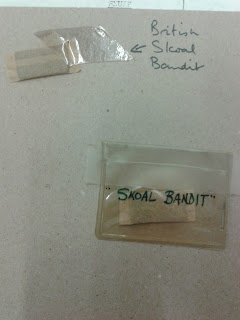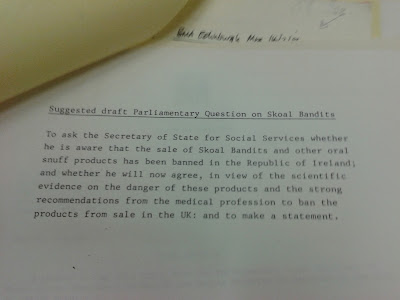This all reminded me of some much older ASH correspondence that I looked at several years ago when I was writing The Art of Suppression. Back then, I spent a couple of afternoons at the Wellcome Library in London where there is a large collection of ASH documents going back to the group's inception in 1971. I was looking for documents about snus and I wasn't disappointed. There were boxes of them.
The similarities between today's e-cigarette panic and the snus panic of the 1980s are uncanny. So uncanny that you might think that 'public health' people would have learned a lesson. To be fair, some have - including ASH to an extent - but if you look at the WHO, the FDA, the Lancet etc. you can hear exactly the same bogus arguments and hysterical rhetoric that were voiced in the 1980s.
The full story is in the book but the heavily truncated version goes like this: Snus is smokeless tobacco in a pouch that goes under the top lip. It was assumed to cause cancer but doesn't. It was assumed to be a gateway to smoking but isn't. ASH ran a campaign to ban it in Britain and succeeded. The EU then followed. Sweden is now the only EU member state that allows the sale of snus. This graph tells a thousand words...
The whole thing kicked off when an American smokeless tobacco company set up a factory in Scotland to produce a brand of snus called Skoal Bandits, apparently with a government grant.
As early as 1984, Richard Peto had seen the potential of snus as a substitute for people wanting to quit smoking. In 1985, Michael Russell and colleagues (including Robert West) reported the results of new research in a letter to The Lancet. Still working on the (mistaken) assumption that snus caused oral cancer, they concluded that snus 'could help people trying to give up smoking... If all smokers in Britain switched to sachets about 50,000 premature deaths per year might eventually be saved at an annual cost of less than 1,000 deaths from mouth cancer.'
None of this appealed to ASH (then led by David Simpson). Their incomprehension is nicely illustrated by the handwritten comment of 'Weird headline!' next to a news story about snus being a 'threat to cigarettes'. (nb. click to enlarge any of the following images)
Such headlines were rare, however. Thanks to scare-mongering by ASH and the BMA, news reports about snus were almost entirely negative. This, from 1985, is typical. Notice that the BMA were already calling for an outright ban at this stage...
A letter from 1984 shows that ASH were aware of the harm reduction potential of snus but any glimmer of optimism was overwhelmed by the same concerns about 'dual use' that are expressed by anti-vaping activists today...
A 1985 letter from Alexander McCall Smith, the Edinburgh-based chairman of the Association for Non-Smokers' Rights contains another assumption that anti-vaping folk like to make. After stating that his organisation is concerned only with passive smoking and therefore has 'precisely nothing to say about Skoal Bandits', he goes on to say that 'everybody knows' that the product is 'aimed at children' and that 'the whole exercise is to accustom under-age users to nicotine'.
Fears about the 'gateway effect' were commonplace. For example, in this 1985 article headlined '"Ban the Tobacco Bandits" Demand'...
In a letter dated 11 April 1985, David Simpson brings up both the gateway theory and the precautionary principle:
“We have had the matter raised in parliament and numerous times in the press but I fear that by the time there is concrete evidence that young people progress from using this product to smoking cigarettes, it will be too late for action – the usual story.”
In January 1986, Ireland banned snus. Hong Kong and Australia followed suit soon afterwards. A letter from the Australian anti-smoking campaigner Nigel Gray to the Australian Minister of Health shows the lengths to which prohibitionists go to convince people that they are not prohibitionists. 'In relation to civil liberties', he writes, 'this move would not impair them at all. If individuals wish to chew tobacco they can obtain and prepare it for themselves by breaking up cigarettes.' Hmm.
In the UK, the campaign to ban snus was led by David Simpson of ASH and Alison Hillhouse of ASH Scotland. They initially focused on the loophole in the law that allowed oral tobacco to be sold to children. When this was sensibly closed in July, a full ban was the 'next logical step', as a press release from the United Kingdom Coordinating Committee on Cancer Research made clear...
The Government has taken steps to ban the sale of oral snuff to people under 16 but this is unlikely to be effective in stopping the spread of this addictive habit... only a total ban on the import, manufacture and sale of oral snuff will be adequate to prevent the widespread use of this carcinogenic material.
Simpson had extensive correspondence with the Labour MP Robert Wareing who agreed to ask questions in parliament. ASH helpfully gave him the exact wordings of these questions...
In June 1987, the WHO issued a press release calling for a 'pre-emptive ban' on snus - indeed, on all smokeless tobacco - 'to prevent a new public health epidemic from a new form of tobacco use'.
'Although promoted as an alternative to cigarettes, specifically in North America and Western Europe, smokeless tobacco is described by WHO a "new threat to society" - particularly to young males who are thus far the major targets in sophisticated promotional and advertising campaigns.'
The UK banned the sale and manufacture of snus in 1989. The EEC followed suit in 1992. Sweden got an exemption when it joined the EU in 1995. Sweden's smoking rate is now less than half the EU average and is the lowest in the developed world.
Viva public health!












No comments:
Post a Comment